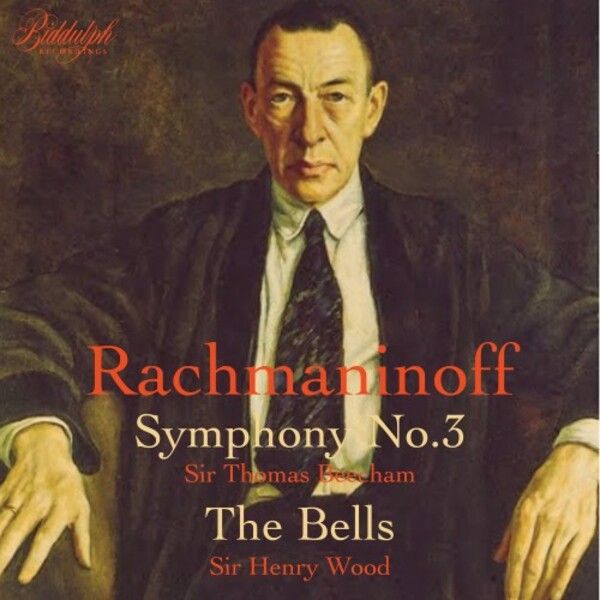Rachmaninoff Back through Time: Beecham and Wood
Once again, music lovers are in Biddulph’s debt - these are vitally important performances

Sir Thomas Beecham conducting Rachmaninoff's Third Symphony with the London Philharmonic is a mouth-watering prospect. a coupling of The Bells conducted by Sir Henry Wood basically seals the deal here.
The engineering for this release from Biddulph is impeccable. The source was a collection of discs recorded from radio broadcasts during the 1930s by one Harold Vincent Marriott (who particularly enjoyed Russian music). Mike Sell inherited Marriott's collection, and donated it to the British Library. The performace of the Third Symphony here is that of the UK premiere - Beecham did not perform it again, a decision possibly related to the lukewarm press reaction at he time.
When we considered Rachmaninoff's First Symphony, we pitted Lan Shui and the Signaporeans on BIS against the Philadelphia Orchetsra udner Nézet-Séguin; Shui's boxed set was bound to return for comparision here.
To my ears there is a sense of freshness, and of adventure even, in the London performance above - and despite some surface noise, there is plenty of detail in the Biddulph. Shui is again, as in the First Symphony post, taut and disciplined. The BIS sound is bright (reflecting some aspects of the composer's orchestration nicely), and Shui again is abile to rein in any temptation to over-emote. Then there is the rather obvious fact that Shui has had much more time to saturate himself in the score and its recorded/performance oineage: when Beecham conducted the ink was basically still wet on the paper.
Here’s the Shui:
The central Adagio ma non troppo is mesmeric in Beecham's hands: the ascending phrases really seem to aspire, as if searching for the unknown. Horns puncture the phrase poingnantly at one point, before a flute sings its tune against a harp. That so much detail is audible offers real pleasure. This happens to be a strong movement for Shui, too, but I find Beecham more atmospheric:
Shui is certainly affectionate and galvanises his players to expressive heights (and or course is blessed with crystelline sound); the two readings complement each other more here, I feel:
There is huge energy to Beecham's finale, which seems to fly with the wind. It is certainly bracing, and absolutely uninhibited - so that the power of the forward movement runs through the more lyrical moments. There is a lot of swish audible here, it is true, but what an event this is:
Shui is almost regimented in comparison:
The choral symphony The Bells (1913) is a setting of Edgar Allan Poe (in Konstantin Balmont’s Russian version). The UK premiere was due for the Sheffield Festival of 1914, but was postponed due to the First World War. It was Wood who conducted the eventual premiere in March 1921, there with the Liverpool Philharmonic Orchestra and Chorus. In February 1937, Wood conducted the present performance in Queen’s Hall, London, and this is the broadcast heard here. The ‘Philharmonic Choir’ used was 400-strong! Although the Radio Times listed Harold Williams as the baritone soloist, he was replaced at the eleventh hour by Roy Henderson; the performance is sung in English (in a translation by Fanny S, Copeland).
Biddulph’s transfer of this Queen’s Hall performance enables us to enjoy the magic of Rachmaninoff's scoring of the opeing “The Silver Sleigh Bells,” and the power of the chorus remains palpable. Parry Jones (1881-1963) is the tenor soloist:
The soprano soloist is Isobel Baillie (1895-1983): here she is, radiant, in the Lento second movement, “The Mellow Wedding Bells”:
The chorus is absolutely blistering in the Presto third movement, “The Alarm Bells” (and the timpani retains its presence in the recording, too!):
Finally, the Lento lugubre finale: “The Mournful Iron Bells”. How heavy the opening: how piercing the sudden brass accent, how poignant the woodwind solos. It is here that baritone Roy Henderson (1899-2000) makes his emotive mark, pained, his voice perfectly laden with grief:
... and here, as a relevant comparison, is a performance conducted by the great Kirill Kondrashin, with soloists Mikhail Dovenman, Yelizaveta Shumskaya and Alexei Bolshakov with the RSFSR Academic Russian Chorus and the Moscow Philharmonic Symphony Orchestra in a studio recording, Moscow, 1963:
... and here’s a link to the digital booklet of the Bidduplh: https://amzn.to/3OdyVsk, and also please note the Shui 3-disc box is currently 25% off at the link below.
Finally, the British Library has published a fascinating article on these two performances: click this link.
Once again, music lovers are in Biddulph’s debt. These are vitally important performances. It is a privilege - and a pleasure - to hear them.
